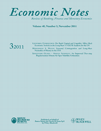
Economic Notes
Scope & Guideline
Contributing to the Evolution of Economic Scholarship
Introduction
Aims and Scopes
- Financial Markets and Instruments:
The journal explores the dynamics of various financial markets including stock exchanges, cryptocurrency markets, and banking systems, analyzing their impact on economic stability and growth. - Economic Policies and Their Effects:
A significant focus is placed on the evaluation of economic policies, such as monetary and fiscal measures, and their implications on financial inclusion, inequality, and market performance. - Regional Economic Studies:
Research on emerging and frontier markets, particularly in Africa and the MENA region, is prominent, highlighting region-specific economic challenges and strategies for development. - Financial Inclusion and Development:
The journal emphasizes the importance of financial inclusion as a means to promote economic development, particularly among marginalized groups and regions. - Interdisciplinary Approaches:
Economic Notes encourages interdisciplinary research that merges economics with finance, sociology, and political science to address complex economic phenomena.
Trending and Emerging
- Impact of Digital Finance:
There is a growing emphasis on the adoption and implications of digital financial services, particularly in developing economies, as evidenced by studies on fintech and financial inclusion. - Cryptocurrency Market Dynamics:
Research exploring the volatility and interdependencies within cryptocurrency markets is on the rise, indicating a burgeoning interest in understanding these new financial instruments. - Socioeconomic Impacts of Financial Inclusion:
The journal is increasingly publishing studies that examine how financial inclusion affects social outcomes, such as gender equality and economic mobility, particularly in underrepresented regions. - Macroeconomic Policy and Inequality:
Papers analyzing the relationship between macroprudential policies and income inequality are becoming more prevalent, highlighting the need to consider equity in economic policy design. - Behavioral Economics and Decision-Making:
Emerging research in behavioral economics, particularly in the context of financial decision-making and market behavior, is gaining traction, reflecting a broader trend in economic research.
Declining or Waning
- Traditional Banking Practices:
Research centered around conventional banking operations is becoming less prominent as the focus shifts toward fintech innovations and the impacts of digital financial services. - Static Economic Models:
There appears to be a waning interest in static economic models as dynamic and empirical analyses gain traction, particularly in understanding real-time market behaviors. - Cryptocurrency Regulation:
While cryptocurrencies were once a hot topic, the frequency of papers solely focused on their regulation has diminished, possibly due to a maturing understanding of the market. - General Economic Theory:
Publications that primarily discuss established economic theories without empirical backing are seeing a decline, as the journal favors more applied and evidence-based research.
Similar Journals
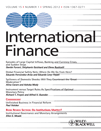
International Finance
Advancing global financial insights.International Finance is a prestigious academic journal published by WILEY, dedicated to the exploration and advancement of theories and practices in the realms of finance, development, and geography. With a strong emphasis on empirical and theoretical research, this journal provides a crucial platform for researchers, professionals, and students to disseminate cutting-edge findings that shape our understanding of the financial landscape on a global scale. Holding an impressive impact factor and categorized in the Q2 quartile across multiple disciplines, including Development, Finance, and Geography, the journal has established itself as a significant contributor to scholarly discourse. Since its inception in 1998 and spanning until 2024, International Finance offers a comprehensive overview of current trends and challenges faced in financial contexts, enhancing the decision-making processes within academia and industry alike. Although the journal is not open access, its rigorous peer-review process guarantees high-quality content that is indispensable for anyone engaged in the diverse fields intersecting with finance.
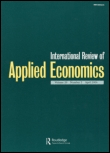
International Review of Applied Economics
Bridging Theory and Practice in EconomicsInternational Review of Applied Economics is a leading journal dedicated to the dissemination of innovative research in the fields of economics and econometrics. Published by Routledge Journals, a renowned name in academic publishing under Taylor & Francis Ltd., this journal has established itself as a key resource for scholars, practitioners, and decision-makers. With an impressive Q2 ranking in the category of Economics and Econometrics, and positioned in the 70th percentile based on Scopus rankings, it provides a platform for high-quality, peer-reviewed articles that address contemporary economic issues. The journal aims to facilitate the understanding of applied economic theory and practice, and it accepts a diverse range of contributions including empirical studies, theoretical analyses, and methodological advancements. Operating from the United Kingdom, it has been a significant contributor to the academic dialogue since its inception in 1987, fostering knowledge exchange through rigorous scholarship. Researchers, professionals, and students alike will find valuable insights that inform policy-making and economic strategy in its pages.

INTERNATIONAL ECONOMICS AND ECONOMIC POLICY
Transforming Economic Theory into Global Policy ActionINTERNATIONAL ECONOMICS AND ECONOMIC POLICY, published by Springer Heidelberg, is a pivotal journal in the field of economics, focusing on both theoretical and empirical research that addresses pressing international economic issues. With an ISSN of 1612-4804 and an E-ISSN of 1612-4812, this journal has been a reliable source of insights since its inception and is poised for continuous growth, converging its themes from 2005 to 2024. Ranked in the Q2 category of Economics and Econometrics in 2023, it stands at a commendable 63rd percentile among similar journals, emphasizing its significance and impact in the academic community. Located in Heidelberg, Germany, the journal provides an access portal for researchers, professionals, and students to engage with cutting-edge economic analyses that inform policy and practice globally. By publishing original articles, reviews, and policy discussions, INTERNATIONAL ECONOMICS AND ECONOMIC POLICY plays a crucial role in shaping the discourse within the global economics landscape.

AUSTRALIAN ECONOMIC PAPERS
Empowering economists with cutting-edge research and analysis.Australian Economic Papers is a leading scholarly journal dedicated to advancing the field of economics, published by Wiley in the United Kingdom. With a robust legacy dating back to its inception in 1962, this journal has earned a reputable position in the academic community, reflected in its Q2 classification in the Economics, Econometrics and Finance category for 2023, and its rank of #76/288 in the Scopus database, placing it within the 73rd percentile. Australian Economic Papers seeks to publish rigorous research that addresses a diverse range of topics within economics, fostering a deep understanding of contemporary economic issues. It serves as an essential resource for researchers, professionals, and students aiming to explore innovative economic theories and empirical studies. While currently not available as an Open Access journal, its contributions are invaluable for those seeking to enrich their knowledge and engage with cutting-edge research in the dynamic field of economics.
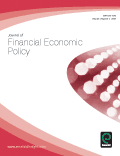
Journal of Financial Economic Policy
Navigating the complexities of finance and economics for impactful solutions.Journal of Financial Economic Policy is a premier academic journal published by EMERALD GROUP PUBLISHING LTD, focusing on the intersection of finance and economics. Through rigorous peer-reviewed research, the journal aims to advance understanding of financial policies and economic frameworks, addressing critical issues faced by financial markets and institutions. With an ISSN of 1757-6385 and an E-ISSN of 1757-6393, it serves as a reputable source of information for researchers, professionals, and students alike. The journal operates within the United Kingdom and is recognized for its contributions to the fields of economics and finance, achieving a Q3 category ranking in both disciplines as per the 2023 metrics. This places it within the top half of journals in its category according to Scopus ranks, demonstrating a solid impact in the academic community. Although it is not an open-access journal, the insights and analyses published are invaluable for those seeking to grasp complex financial phenomena and develop effective policies. The journal’s scope encompasses a wide range of topics relevant to contemporary finance and economic strategies, making it an essential resource for ongoing scholarly discourse and practical applications.
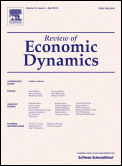
REVIEW OF ECONOMIC DYNAMICS
Pioneering Research in Dynamic Economic AnalysisREVIEW OF ECONOMIC DYNAMICS, published by Academic Press Inc, Elsevier Science, is a leading academic journal in the field of economics and econometrics, holding a distinguished Q1 ranking in its category as of 2023. With an impactful focus on the theoretical and empirical analysis of dynamic economic systems, the journal seeks to advance our understanding of economic dynamics through innovative research that addresses contemporary issues and policy implications. The journal boasts a significant history of contributions from renowned scholars since its inception in 1998, and will continue to publish through 2025. Although it does not currently offer open access options, the journal serves as a crucial resource for researchers, professionals, and students who are keen to explore and engage with the latest findings in economic theory and practice. With a current Scopus rank of #280 out of 716 in the Economics and Econometrics category, the REVIEW OF ECONOMIC DYNAMICS remains an invaluable platform for scholarly discussion and insight into the complexities of economic behavior.
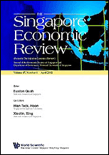
SINGAPORE ECONOMIC REVIEW
Fostering dialogue and innovation in economic theory and practice.SINGAPORE ECONOMIC REVIEW, published by WORLD SCIENTIFIC PUBL CO PTE LTD, stands as a prominent platform for research in the fields of economics and econometrics since its inception in 1983. With an ISSN of 0217-5908 and an E-ISSN of 1793-6837, this journal caters to a diverse audience by presenting high-quality, rigorously reviewed articles that address pressing economic issues both in Singapore and globally. Currently classified in the Q3 category for Economics and Econometrics for 2023, it ranks #265 out of 716 in Scopus, placing it in the 63rd percentile among economic journals. Although not open access, the articles published here contribute valuable insights into the evolving dynamics of economic theory and practice, making it an essential resource for researchers, educators, and policymakers alike. The journal's commitment to advancing economic research continues to foster dialogue and inspire innovative approaches within the academic community.

Romanian Journal of Economic Forecasting
Innovating the landscape of economic forecasting since 2008.Welcome to the Romanian Journal of Economic Forecasting, a prestigious publication dedicated to advancing the field of economics and econometrics since its inception in 2008. Published by the Institute of Economic Forecasting, this esteemed journal provides a platform for scholarly articles that contribute to the theoretical and practical understanding of economic trends and forecasting methods. With an impactful presence in the Q3 category of Economics, Econometrics, and Finance, it ranks well on Scopus within its field, holding position #130 out of 288 journals, placing it in the 55th percentile. The Romanian Journal of Economic Forecasting aims to bridge the gap between theory and practice, making it a crucial resource for researchers, professionals, and students eager to engage with contemporary economic issues. Though it operates under traditional accessibility, it encourages authors from diverse backgrounds to share their groundbreaking research, fostering a dynamic academic environment. Explore the rich insights offered by this journal and join a community dedicated to the evolution of economic thought.

Voprosy Ekonomiki
Empowering Scholars with Rigorous Economic AnalysisVoprosy Ekonomiki, a well-established journal published by VOPROSY EKONOMIKI, NP, serves as a vital platform for dissemination of economic research and discourse in the Russian Federation and beyond. With a rich publication history dating back to 1978, the journal covers a broad spectrum of topics within the fields of Business, Economics, Finance, and History, reflecting its interdisciplinary nature. Notably, it holds a Q3 classification in major categories such as Business and International Management, Economics and Econometrics, and Finance, indicating its reputable standing in academic circles. While Voprosy Ekonomiki is not an open-access publication, it provides extensive insights that are instrumental to researchers, professionals, and students looking to enhance their understanding of economic theory and practice. With its inclusion in Scopus and commendable rankings in various disciplines, this journal proves to be an essential resource for those engaged in the dynamic study of economics.

African Review of Economics and Finance-AREF
Empowering Financial Discourse in the African ContextAfrican Review of Economics and Finance (AREF) is a distinguished academic journal dedicated to advancing knowledge in the fields of economics and finance within the African context. Published by PORTHOLOGOS PRESS, the journal aims to provide a platform for research that addresses critical economic and financial issues that affect Africa, promoting innovative solutions and fostering discussion among scholars and practitioners. With its ISSN 2042-1478 and E-ISSN 2410-4906, AREF has established itself as a vital resource for researchers, professionals, and students seeking to deepen their understanding of African economies. The journal’s commitment to open access ensures that its valuable research findings are readily available to a global audience, thereby enhancing visibility and engagement. Through rigorous peer-review processes and thoughtful editorial leadership, AREF contributes significantly to the discourse on economic development, policy analysis, and financial practices in the region.